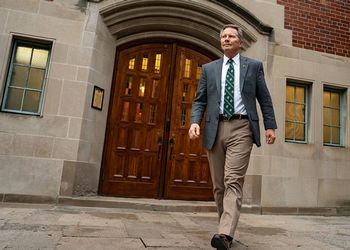From the President - Fall 2022
Big prospects from tiny particles

Greetings, Spartans! A new academic year is underway, and campus is once again vibrant with activity.
One of the most exciting recent developments is the product of many years of planning, and it is featured in this issue: the Facility for Rare Isotope Beams, or FRIB, a user facility MSU operates for the U.S. Department of Energy Office of Science.
You might know that my career journey started with infectious disease research, where I enjoyed the challenge and thrill of discovery. Over time, I found increasing pleasure in applying my skills to facilitate others’ research, moving me toward my current role in university administration.
I get the same feeling of satisfaction working to leverage the many opportunities and possibilities presented by FRIB, which opened for user operations in May.
FRIB grew from seeds planted many years ago by forward-looking leaders whose vision was to develop a nuclear science program at MSU. They began by designing, building and funding MSU’s first cyclotron, the K50, completed in 1965 and used for nuclear physics research with proton beams. The university has long since been home to the National Superconducting Cyclotron Laboratory, which conducted its first experiment in 1982, and concluded operations this year as FRIB came online.
Among its many contributions to our society, nuclear science has shepherded key advances in medical technology, such as MRI and PET diagnostic machines, plus everyday technology, such as smoke detectors and cell phones. Potential applications for the isotopes created by FRIB are endless.
FRIB puts MSU in a position of great influence to define the scope of rare isotope applications. The U.S. Department of Energy Office of Science Nuclear Physics Program is providing $13 million over four years to build FRIB’s isotope harvesting capabilities. The DOE Isotope Program supports the grant.
Fighting cancer is one such area of isotope harvesting application that holds great promise. FRIB experiments will generate a supply of otherwise costly, shortlived radioisotopes that could yield novel ways of hunting and possibly neutralizing cancer cells.
FRIB is an excellent example of MSU’s research leadership that connects in innovative ways to other priority fields of scientific inquiry and discovery, illustrating the cross-disciplinary synergies we seek to leverage across our university. It is a source of great pride to Spartans everywhere, and I look forward to seeing the many ways it can positively impact our lives.
Go Green!

Samuel L. Stanley Jr., M.D.
PRESIDENT, MSU



